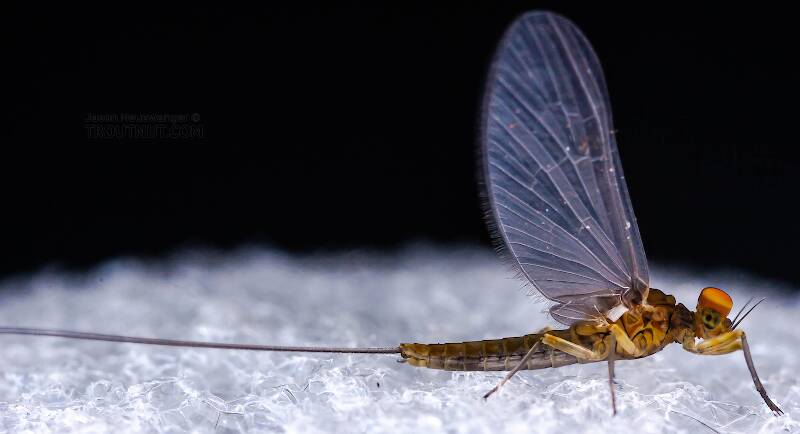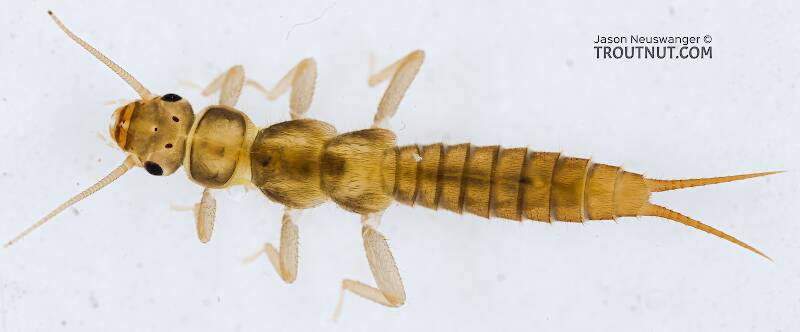
Blue-winged Olives
Baetis
Tiny Baetis mayflies are perhaps the most commonly encountered and imitated by anglers on all American trout streams due to their great abundance, widespread distribution, and trout-friendly emergence habits.
Featured on the forum

This species was fairly abundant in a February sample of the upper Yakima.

Troutnut is a project started in 2003 by salmonid ecologist Jason "Troutnut" Neuswanger to help anglers and
fly tyers unabashedly embrace the entomological side of the sport. Learn more about Troutnut or
support the project for an enhanced experience here.
Leakywaders on Jan 15, 2009January 15th, 2009, 12:41 pm EST
I've been thinking about this a long time. A comment in the dubbing post over in fly tying promped me to actually post it.
In Borger's book, NYMPHING, A BASIC BOOK, he says:
"It is sensitive enough to detect some molcules in concentrations as one in a hundred billion. (man's limit is one in a billion)" Think about the next time you have gas in your wasders. "Fish can recognise the smell of oiher fish and distinguish between species....Trout and salmon are repelled by the smell of mammel skin, including man's. Handeling a fly will get your scent om it, and though it will soon wash off, some anglers wipe sardine oil, or anise oil on their hands to cut the human oil. ... In order to taste, a fish need only touch the fly with his lips."
In Jones' book KNOWING BASS
In Borger's book, NYMPHING, A BASIC BOOK, he says:
"It is sensitive enough to detect some molcules in concentrations as one in a hundred billion. (man's limit is one in a billion)" Think about the next time you have gas in your wasders. "Fish can recognise the smell of oiher fish and distinguish between species....Trout and salmon are repelled by the smell of mammel skin, including man's. Handeling a fly will get your scent om it, and though it will soon wash off, some anglers wipe sardine oil, or anise oil on their hands to cut the human oil. ... In order to taste, a fish need only touch the fly with his lips."
In Jones' book KNOWING BASS
Drag free??? If the fly didn't drag, I wouldn't know where it was!!
Leakywaders on Jan 15, 2009January 15th, 2009, 12:50 pm EST
How did that happen... Dam puter
As I wa saying...
(OK, its not trout, but fish are fish) All fish are highly sensitive to smell, Bass fisherman, and commercial fisherman have used scents for years (not going into catfish, I have a limit). I also read somewhere that they get really upset in New Zealand if you wase wet, as it scares the fish. And, we all know enough NOT to pee in the stream, right?
Berkly spent millions developing their scents (they make one for trout)Although I wouldn't use it on a dry, seems like they would work on deer hair flies, like muddlers...
Does anybody use scents on flies?
Oh, almost forgot, my Dad used to spit on his hooks. But hed did a lot of wierd stuff.
As I wa saying...
(OK, its not trout, but fish are fish) All fish are highly sensitive to smell, Bass fisherman, and commercial fisherman have used scents for years (not going into catfish, I have a limit). I also read somewhere that they get really upset in New Zealand if you wase wet, as it scares the fish. And, we all know enough NOT to pee in the stream, right?
Berkly spent millions developing their scents (they make one for trout)Although I wouldn't use it on a dry, seems like they would work on deer hair flies, like muddlers...
Does anybody use scents on flies?
Oh, almost forgot, my Dad used to spit on his hooks. But hed did a lot of wierd stuff.
Drag free??? If the fly didn't drag, I wouldn't know where it was!!
Softhackle on Jan 15, 2009January 15th, 2009, 3:33 pm EST
Hi,
I'm sure fish small our scent on lures and flies. I do believe it will get dissipated by the water to some degree. The thing is, how do we know when fish can detect this oder. Is it always? Just sometime? How do we know that added scents are not just as repulsive? It is a game of guesses.
PS- I often wet my wet flies in my mouth to make them sink as soon as they hit the water. That does not seem to turn fish off.
Mark
I'm sure fish small our scent on lures and flies. I do believe it will get dissipated by the water to some degree. The thing is, how do we know when fish can detect this oder. Is it always? Just sometime? How do we know that added scents are not just as repulsive? It is a game of guesses.
PS- I often wet my wet flies in my mouth to make them sink as soon as they hit the water. That does not seem to turn fish off.
Mark
"I have the highest respect for the skilled wet-fly fisherman, as he has mastered an art of very great difficulty." Edward R. Hewitt
Flymphs, Soft-hackles and Spiders: http://www.troutnut.com/libstudio/FS&S/index.html
Flymphs, Soft-hackles and Spiders: http://www.troutnut.com/libstudio/FS&S/index.html
PigDush on Jan 15, 2009January 15th, 2009, 7:25 pm EST
Hi Guys,
The initial post is reminiscent of a variety of points made by Bill James in his book "Catching Trout in Australia" that I believe is a very respected text, or at least it was when I bought it many years ago. Amongst other things, he says:
"Trout locate their food through the use of sight, smell and hearing but the final attack on prey is accomplished through use of vision" (p.55)
"So keen is a trout's perception through this sense and so superior is it to the miserable olfactory functions of humans that its sensitivity must be inconceivable to man" (p.60), on the trout's sense of smell.
"Anadromous fish, such as sea-running salmon and trout, swim hundreds or even thousands of kilometres to find their way back to the stream of their birth by tracing odours that are unique to that stream. Salmon have been known to pause in their spawning run because of the smell of bears that had drifted downstream to them in the current. On other occasions, salmon have been deterred by the smell of man that permeated the water merely through the rinsing of hands" (p.60), on the salmonoid sense of smell, and observations of salmon.
"Trout have been known to refuse artificials that are tainted by human hands and yet accept the same artificials after they had been doused in spittle. Strange as it might seem, human spittle proved to be the third taste preference, after worm and liver, when tested on catfish" (p.60)
"Experiments with Chinook salmon disclosed that they were able to detect seal and sea-lion extracts at dilutions of one part in eighty billion" (p.60)
"There is no doubt that it is very often a fish's sense of smell and sense of hearing that draws it to the location of food which then enables it to target the food visually" (p.60)
Of the sense of taste, James suggests that as with humans smell and taste are closely linked, however "taste relies on contact or close proximity".
I also recall reading somewhere in James' book or perhaps another that the scent of a human may be 'rinsed off' after two or three casts, however I don't recall whether that was specific to bait, artificials, or both.
In an interesting sidenote within the book somewhere James also notes that anthropomorphism of a trout's behaviour (likening it to a human's) - particularly its ability to reason - is a mistake, and as such suggests that if it smells right, tastes right, looks right, feels right, and the trout is hungry, it will eat it. James' emphasis on smell however, is so profound that I am often convinced that it is of the greatest importance to anglers bar none. I then have to remind myself that fish are regularly caught on artificials that even without a human scent are unlikely to smell like the real thing (plastic vs a minnow, fur vs an insect). It would then have to be assumed that in the presence of a hatch or other food rich event, either:
1. the scent of all the other insects are able to suitably disguise that of the artificial.
2. the movement of the water is such that smell becomes unreliable with many smells mixing or turbulence disturbing scent direction, and therefore in clearer water with reasonable light vision must be relied upon more readily until a morsel can be tasted or felt.
Situations like these would account for the ability of an angler to catch fish on artificials in food rich or fast waters, however wouldn't explain the ability to successfully fish artificials in lakes.
It may require a more thorough study of the book to properly discern James' ranking of the importance of the trout's senses, however I hope I have provided at least a few points that one can ponder.
Those are my two cents anyway,
Joel.
The initial post is reminiscent of a variety of points made by Bill James in his book "Catching Trout in Australia" that I believe is a very respected text, or at least it was when I bought it many years ago. Amongst other things, he says:
"Trout locate their food through the use of sight, smell and hearing but the final attack on prey is accomplished through use of vision" (p.55)
"So keen is a trout's perception through this sense and so superior is it to the miserable olfactory functions of humans that its sensitivity must be inconceivable to man" (p.60), on the trout's sense of smell.
"Anadromous fish, such as sea-running salmon and trout, swim hundreds or even thousands of kilometres to find their way back to the stream of their birth by tracing odours that are unique to that stream. Salmon have been known to pause in their spawning run because of the smell of bears that had drifted downstream to them in the current. On other occasions, salmon have been deterred by the smell of man that permeated the water merely through the rinsing of hands" (p.60), on the salmonoid sense of smell, and observations of salmon.
"Trout have been known to refuse artificials that are tainted by human hands and yet accept the same artificials after they had been doused in spittle. Strange as it might seem, human spittle proved to be the third taste preference, after worm and liver, when tested on catfish" (p.60)
"Experiments with Chinook salmon disclosed that they were able to detect seal and sea-lion extracts at dilutions of one part in eighty billion" (p.60)
"There is no doubt that it is very often a fish's sense of smell and sense of hearing that draws it to the location of food which then enables it to target the food visually" (p.60)
Of the sense of taste, James suggests that as with humans smell and taste are closely linked, however "taste relies on contact or close proximity".
I also recall reading somewhere in James' book or perhaps another that the scent of a human may be 'rinsed off' after two or three casts, however I don't recall whether that was specific to bait, artificials, or both.
In an interesting sidenote within the book somewhere James also notes that anthropomorphism of a trout's behaviour (likening it to a human's) - particularly its ability to reason - is a mistake, and as such suggests that if it smells right, tastes right, looks right, feels right, and the trout is hungry, it will eat it. James' emphasis on smell however, is so profound that I am often convinced that it is of the greatest importance to anglers bar none. I then have to remind myself that fish are regularly caught on artificials that even without a human scent are unlikely to smell like the real thing (plastic vs a minnow, fur vs an insect). It would then have to be assumed that in the presence of a hatch or other food rich event, either:
1. the scent of all the other insects are able to suitably disguise that of the artificial.
2. the movement of the water is such that smell becomes unreliable with many smells mixing or turbulence disturbing scent direction, and therefore in clearer water with reasonable light vision must be relied upon more readily until a morsel can be tasted or felt.
Situations like these would account for the ability of an angler to catch fish on artificials in food rich or fast waters, however wouldn't explain the ability to successfully fish artificials in lakes.
It may require a more thorough study of the book to properly discern James' ranking of the importance of the trout's senses, however I hope I have provided at least a few points that one can ponder.
Those are my two cents anyway,
Joel.
JAD on Jan 16, 2009January 16th, 2009, 5:34 am EST
Informative post Joel. They have made scented products for years, fly floatant, wax, different fish scents, Krill fish attractant, and last but not least WD40. They have mostly all gone by the way side because of profit,they didn't make enough. IMHO- one of the best floatant was made from white gas and paraffin(Bergman) and still to this day, I still pre soak my dries in the stuff.
I think scents mater, but I think many other things are far more important --Pressure- movement-drag--the right pattern--I think you get the idea.
Thanks for making me think.
John--JAD

I think scents mater, but I think many other things are far more important --Pressure- movement-drag--the right pattern--I think you get the idea.
Thanks for making me think.
John--JAD

They fasten red (crimson red) wool around a hook, and fix onto the wool two feathers which grow under a cock’s wattles, and which in colour are like wax.
Radcliffe's Fishing from the Earliest Times,
Softhackle on Jan 16, 2009January 16th, 2009, 7:34 am EST
Hi,
I'm not totally convinced that the sense of taste and smell are connected together, although I surely believe that trout can smell and taste. Whether these senses determine if a fish takes a fly or not, I don't know.
My doubt is based on the fact that a trout's nostrils (in the brown trout there are two on each side) are not connected to the throat as they are in humans. The nostrils lead to blind sacs just under the skin. These sacs are filled with sensory tissue and cilia and the water is filtered through these sacs from water going into the front nostril and out the rear one.
Mark
I'm not totally convinced that the sense of taste and smell are connected together, although I surely believe that trout can smell and taste. Whether these senses determine if a fish takes a fly or not, I don't know.
My doubt is based on the fact that a trout's nostrils (in the brown trout there are two on each side) are not connected to the throat as they are in humans. The nostrils lead to blind sacs just under the skin. These sacs are filled with sensory tissue and cilia and the water is filtered through these sacs from water going into the front nostril and out the rear one.
Mark
"I have the highest respect for the skilled wet-fly fisherman, as he has mastered an art of very great difficulty." Edward R. Hewitt
Flymphs, Soft-hackles and Spiders: http://www.troutnut.com/libstudio/FS&S/index.html
Flymphs, Soft-hackles and Spiders: http://www.troutnut.com/libstudio/FS&S/index.html
Trtklr on Jan 16, 2009January 16th, 2009, 9:52 am EST
i wondered in another thread if wiping my forehead for oil to help me dub would put my scent into the dubbing. oil doesn't come off so easy and i can see how it would hold onto dubbing.(i use dubbing wax on my fingers to dub fyi). i have read that scientist have identified the compound coming off a bear that alerts salmon of the danger, this article also said human skin has this same compound. it isn't about wether a fish will eat an insect because it smells like one. the question is if it smells or tastes human in the water coming off the wet fly and is deterred by it.(i use dubbing wax on my fingers to dub fyi). i would think by some of what leakywaders said and my own thought process that the answer would be yes, the fish can smell/taste human and be turned off by it. the question in my mind also is wondering how long does that smell stay on the fly. we've heard that wd-40 works for catching fish, i have always thought that it masks or removes human scent. i have also heard that saliva does not have the compound that fish smell. i have seen what looks like a stainless steel bar of soap that alleges to remove scent. i saw it at gander and at cabelas in the fishing dept. and it was marketed for such.
I have seen nothing more beautiful than the sunrise on a cold stream.
Softhackle on Jan 16, 2009January 16th, 2009, 10:38 am EST
I've heard repeated stories of two fisherman fishing together. One catches fish while the other does not. Then, when the one not catching lets the one catching bait the hook, tie on the lure or fly-or what have you-the one that was not catching starts catching fish. I'm sure others have heard this, too. SO-it may not be, necessarily, human smell, but some ODD/Repulsive smell that a particular human is exuding. Besides-how would a wild trout know what "human" smells like?
Mark
Mark
"I have the highest respect for the skilled wet-fly fisherman, as he has mastered an art of very great difficulty." Edward R. Hewitt
Flymphs, Soft-hackles and Spiders: http://www.troutnut.com/libstudio/FS&S/index.html
Flymphs, Soft-hackles and Spiders: http://www.troutnut.com/libstudio/FS&S/index.html
JAD on Jan 16, 2009January 16th, 2009, 11:44 am EST
Mark ---you know they go to school
I think a fish uses it olfactory gland for different purposes . Breeding and survival would be the most important .
Jad
I think a fish uses it olfactory gland for different purposes . Breeding and survival would be the most important .
Jad
They fasten red (crimson red) wool around a hook, and fix onto the wool two feathers which grow under a cock’s wattles, and which in colour are like wax.
Radcliffe's Fishing from the Earliest Times,
PigDush on Jan 16, 2009January 16th, 2009, 2:43 pm EST
Good points Mark and John,
It makes more sense to me now that particular scents would serve as a deterrent, rather than an attractant. The particular scent of fur and feather in a fly or plastic in a lure would be considered neutral to the trout and the look, action and feel of an artificial would then determine whether a fish is likely to strike.
In regards to a trout's sense of taste and smell being linked, I may have adversely twisted James' words in that case. To quote James directly, "The taste sensations in fish are closely related to those of smell". This is stated in regards to the chemical receptors used in both smell and taste, with taste requiring closer contact than smell. The word 'linked' is probably a poor choice on my part, particularly when relating it to humans where smell and taste are more directly connected.
James does make reference however, to the situation where a bait fisherman might witness a trout take a bait and chew it before spitting it in front of its nose several times to test it before swallowing. Though I am yet to experience the world of fly fishing myself, I am also lead to believe that timing the strike is vital to hooking a fish before it rejects a fly. If I am correct in assuming that this rejection occurs without having to taste or smell a fly a second time, these two points would suggest that taste and smell play at least a reasonable part in the final stages of a trout's feeding process. A fly-fisher would simply cut the final acceptance/rejection stage short by striking before a fly is rejected, after it has not been deterred by its smell and had a taste. One would also assume that a trout's sense of touch would play a part in rejection as well.
On the point of attractants and scents, I personally do not recall a situation where I have caught a fish using such a substance. However this could simply be attributed to my use of the wrong stuff :p
Joel.
It makes more sense to me now that particular scents would serve as a deterrent, rather than an attractant. The particular scent of fur and feather in a fly or plastic in a lure would be considered neutral to the trout and the look, action and feel of an artificial would then determine whether a fish is likely to strike.
In regards to a trout's sense of taste and smell being linked, I may have adversely twisted James' words in that case. To quote James directly, "The taste sensations in fish are closely related to those of smell". This is stated in regards to the chemical receptors used in both smell and taste, with taste requiring closer contact than smell. The word 'linked' is probably a poor choice on my part, particularly when relating it to humans where smell and taste are more directly connected.
James does make reference however, to the situation where a bait fisherman might witness a trout take a bait and chew it before spitting it in front of its nose several times to test it before swallowing. Though I am yet to experience the world of fly fishing myself, I am also lead to believe that timing the strike is vital to hooking a fish before it rejects a fly. If I am correct in assuming that this rejection occurs without having to taste or smell a fly a second time, these two points would suggest that taste and smell play at least a reasonable part in the final stages of a trout's feeding process. A fly-fisher would simply cut the final acceptance/rejection stage short by striking before a fly is rejected, after it has not been deterred by its smell and had a taste. One would also assume that a trout's sense of touch would play a part in rejection as well.
On the point of attractants and scents, I personally do not recall a situation where I have caught a fish using such a substance. However this could simply be attributed to my use of the wrong stuff :p
Joel.
Leakywaders on Jan 25, 2009January 25th, 2009, 4:15 pm EST
Gee, got you guys thimking. I'm impressed.
I diden't say it (DUH) but I was actually thinking of nympths, streamers where the trout ejects the fly in a nanosecond. I suspect that I would catch a lot more fish if they held on a moment longer.
I have also wondered about the fish's feelings (OK, I know they don't love me). I mean since a fish has no hands, the only way they can feel is to pick something up in their mouth. I know my flies do not feel like... well... alive. Keep in mind that, to a trout, something is either alive, or VERY difficult to pass.
When I was a kid, I usually examined the stomics of trout and found all kinds of stuff in there. Leaves, wood, etc. I knew they could not pass that stuff, and it wpuld not digest. I'm thinking now that the were hatchery trout. Everything they eat in a hatchery is dead, so they would eat everything that floated by. Corn, marshmallows, etc. Wild fish only eat things that are alive. I still fish Royal Coachmen a lot, and think the fish says: "What the hell IS that?" and grabs it to investigate.
I diden't say it (DUH) but I was actually thinking of nympths, streamers where the trout ejects the fly in a nanosecond. I suspect that I would catch a lot more fish if they held on a moment longer.
I have also wondered about the fish's feelings (OK, I know they don't love me). I mean since a fish has no hands, the only way they can feel is to pick something up in their mouth. I know my flies do not feel like... well... alive. Keep in mind that, to a trout, something is either alive, or VERY difficult to pass.
When I was a kid, I usually examined the stomics of trout and found all kinds of stuff in there. Leaves, wood, etc. I knew they could not pass that stuff, and it wpuld not digest. I'm thinking now that the were hatchery trout. Everything they eat in a hatchery is dead, so they would eat everything that floated by. Corn, marshmallows, etc. Wild fish only eat things that are alive. I still fish Royal Coachmen a lot, and think the fish says: "What the hell IS that?" and grabs it to investigate.
Drag free??? If the fly didn't drag, I wouldn't know where it was!!
Taxon on Jan 26, 2009January 26th, 2009, 3:20 am EST
Pete-
I suspect you may not be giving the trout digestive/disposal system sufficient credit, as they regularly ingest cased caddis, and even twigs that look like they might contain a cased caddis.
I suspect you may not be giving the trout digestive/disposal system sufficient credit, as they regularly ingest cased caddis, and even twigs that look like they might contain a cased caddis.
Quick Reply
Related Discussions
Topic
Replies
Last Reply
6
Apr 25, 2007
by Troutnut
by Troutnut
17
Oct 4, 2012
by PaulRoberts
by PaulRoberts




